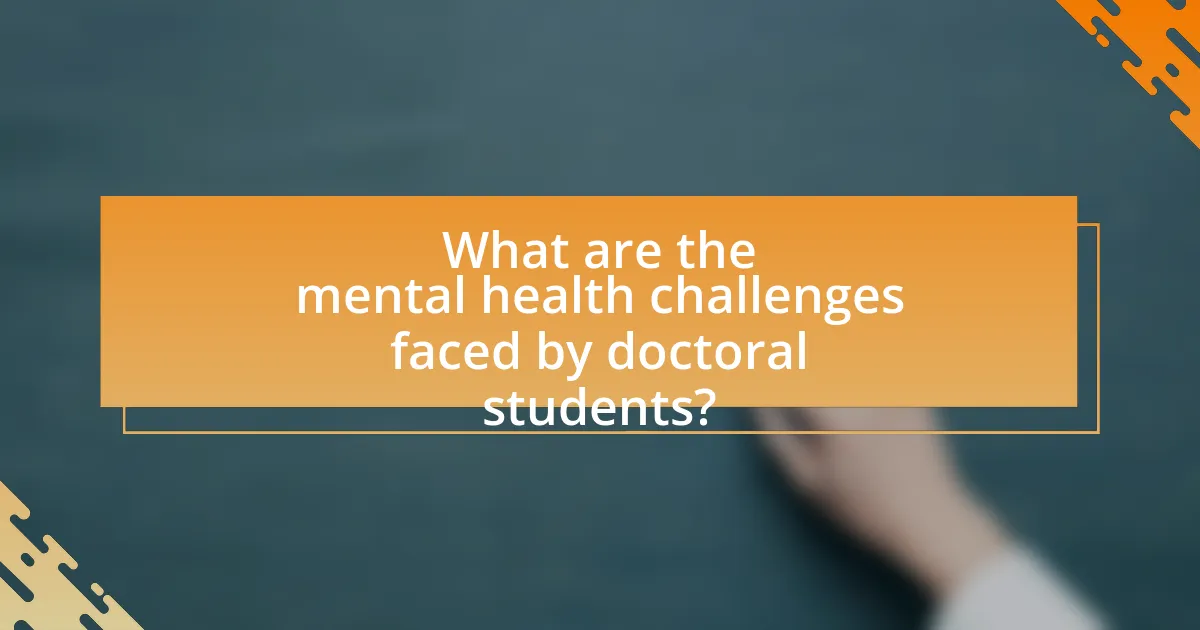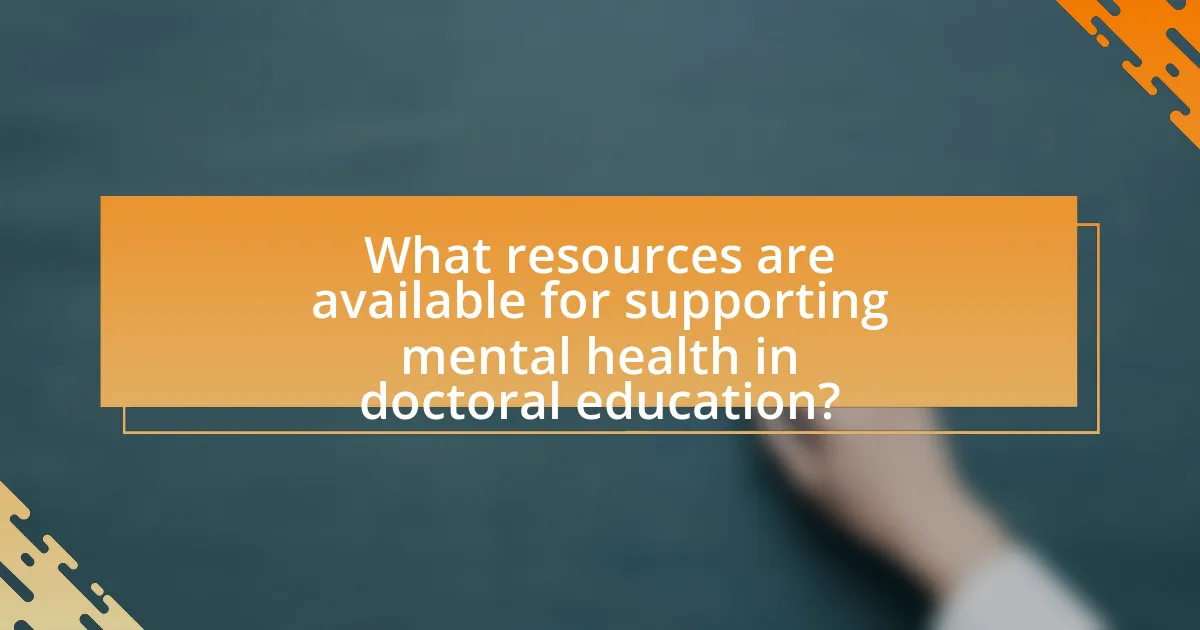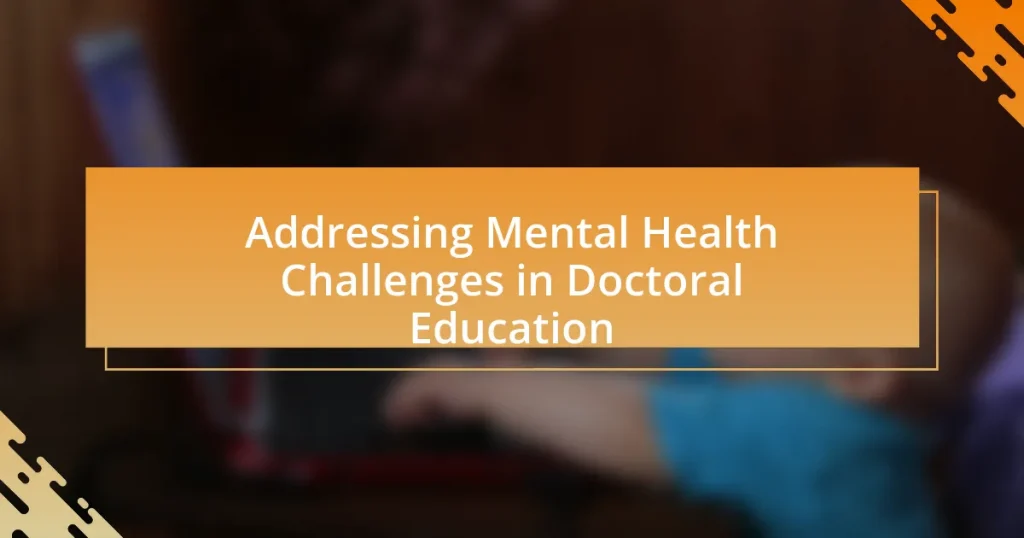The article addresses the significant mental health challenges faced by doctoral students, highlighting issues such as anxiety, depression, and stress, which affect approximately 40% and 30% of this population, respectively. It examines the impact of academic pressures, isolation, financial strain, and work-life balance on students’ mental well-being, emphasizing the need for institutional support and resources. The article also discusses effective strategies for managing mental health, including self-care practices, time management, and seeking professional help, while outlining the role of faculty and peer support in fostering a healthier academic environment. Additionally, it identifies available resources for mental health support, underscoring the importance of addressing these challenges to enhance academic performance and overall quality of life for doctoral students.

What are the mental health challenges faced by doctoral students?
Doctoral students face significant mental health challenges, including anxiety, depression, and stress. Research indicates that approximately 40% of doctoral students experience anxiety, while around 30% report symptoms of depression, often exacerbated by isolation, high expectations, and the pressure to publish. These challenges are compounded by the demanding nature of their research, which can lead to feelings of inadequacy and burnout. A study published in the journal “Nature Biotechnology” found that the mental health of graduate students is a growing concern, highlighting the need for institutional support and resources to address these issues effectively.
How do academic pressures contribute to mental health issues?
Academic pressures significantly contribute to mental health issues by creating high levels of stress and anxiety among students. These pressures often stem from rigorous academic expectations, competition for grades, and the fear of failure, which can lead to feelings of inadequacy and burnout. Research indicates that approximately 40% of graduate students experience anxiety, and 30% report depression, largely due to these academic demands. The American Psychological Association highlights that the intense workload and lack of work-life balance exacerbate these mental health challenges, making it crucial to address these pressures in doctoral education.
What specific stressors are prevalent in doctoral education?
Specific stressors prevalent in doctoral education include academic pressure, isolation, financial strain, and work-life balance challenges. Academic pressure arises from high expectations for research output and performance, often leading to anxiety and burnout. Isolation is common due to the solitary nature of research work, which can contribute to feelings of loneliness and depression. Financial strain is a significant concern, as many doctoral students face limited funding and high tuition costs, impacting their mental well-being. Additionally, balancing academic responsibilities with personal life can create stress, as students struggle to manage time effectively. These stressors have been documented in studies, such as the 2018 report by the Council of Graduate Schools, which highlights the mental health challenges faced by graduate students, emphasizing the need for institutional support.
How do these stressors impact students’ mental well-being?
Stressors significantly impact students’ mental well-being by increasing anxiety, depression, and stress levels. Research indicates that high academic demands, financial pressures, and lack of social support contribute to these mental health issues among students. For instance, a study published in the Journal of Affective Disorders found that 41% of graduate students reported experiencing anxiety, while 39% reported depressive symptoms, highlighting the prevalence of mental health challenges in this population. These stressors can lead to decreased academic performance, impaired social interactions, and overall diminished quality of life, further exacerbating mental health concerns.
What role does isolation play in mental health challenges?
Isolation significantly exacerbates mental health challenges by increasing feelings of loneliness and depression. Research indicates that social isolation can lead to a decline in mental well-being, as individuals who lack social connections are more likely to experience anxiety and depressive symptoms. A study published in the journal “Psychological Science” found that social isolation is linked to higher rates of mental health disorders, highlighting the importance of social support in mitigating these challenges. In the context of doctoral education, students often face isolation due to rigorous academic demands, which can intensify stress and hinder their overall mental health.
How does the nature of doctoral work contribute to feelings of loneliness?
The nature of doctoral work contributes to feelings of loneliness primarily due to its isolating demands and the intense focus required for research. Doctoral candidates often spend long hours working independently on their projects, which can lead to social withdrawal and a lack of interaction with peers. Research indicates that 40% of doctoral students report feelings of isolation, stemming from the pressure to produce original work and the competitive environment of academia. This isolation is exacerbated by the limited opportunities for collaboration, as many doctoral programs emphasize individual achievement over teamwork.
What strategies can help mitigate feelings of isolation?
Engaging in regular social interactions is a key strategy to mitigate feelings of isolation. Participating in study groups, attending academic conferences, and joining professional organizations can foster connections with peers, reducing the sense of loneliness. Research indicates that social support significantly impacts mental well-being; for instance, a study published in the Journal of Higher Education found that doctoral students who actively engaged with their peers reported lower levels of isolation and higher satisfaction with their academic experience. Additionally, utilizing online platforms for networking and collaboration can provide further opportunities for connection, especially for those in remote or hybrid learning environments.
Why is it important to address mental health in doctoral education?
Addressing mental health in doctoral education is crucial because it directly impacts students’ academic performance and overall well-being. Research indicates that doctoral students experience high levels of stress, anxiety, and depression, with studies showing that up to 40% of PhD students report significant mental health issues. These challenges can hinder their ability to complete their programs, leading to lower graduation rates and diminished career prospects. Furthermore, prioritizing mental health support fosters a healthier academic environment, promoting resilience and productivity among students.
What are the long-term effects of unaddressed mental health issues?
Unaddressed mental health issues can lead to significant long-term effects, including chronic psychological disorders, impaired academic performance, and diminished quality of life. Research indicates that individuals with untreated mental health conditions are at a higher risk for developing severe anxiety, depression, and other mental illnesses over time. For instance, a study published in the Journal of Affective Disorders found that untreated depression can lead to a 50% increase in the likelihood of developing chronic health conditions. Additionally, unaddressed mental health issues can result in decreased productivity and increased dropout rates in educational settings, as evidenced by a report from the American Psychological Association, which highlights that students with mental health challenges often struggle to maintain their academic commitments.
How can improved mental health enhance academic performance?
Improved mental health enhances academic performance by increasing focus, motivation, and cognitive function. When students experience better mental well-being, they are more likely to engage in their studies, participate in class discussions, and complete assignments on time. Research indicates that students with positive mental health report higher GPAs and better retention rates. For instance, a study published in the Journal of Educational Psychology found that students with lower levels of anxiety and depression performed significantly better academically compared to their peers with higher levels of these mental health issues. This correlation underscores the importance of mental health support in educational settings, particularly in doctoral education, where the demands can be particularly high.

What resources are available for supporting mental health in doctoral education?
Resources available for supporting mental health in doctoral education include counseling services, peer support groups, mental health workshops, and online resources. Many universities offer dedicated counseling centers that provide individual therapy, group therapy, and crisis intervention specifically for graduate students. Peer support groups foster community and shared experiences, helping students feel less isolated. Mental health workshops often cover stress management, mindfulness, and coping strategies tailored for the unique pressures of doctoral studies. Additionally, online resources such as mental health apps and websites provide accessible information and support, allowing students to seek help at their convenience. These resources are crucial as studies indicate that doctoral students experience higher levels of anxiety and depression compared to the general population, highlighting the need for effective mental health support systems.
How can universities provide mental health support for students?
Universities can provide mental health support for students by implementing comprehensive counseling services, peer support programs, and mental health awareness initiatives. Comprehensive counseling services, including individual therapy, group therapy, and crisis intervention, are essential for addressing the diverse mental health needs of students. For instance, a study by the American College Health Association found that 62% of college students felt overwhelming anxiety, highlighting the necessity for accessible mental health resources. Peer support programs can foster a sense of community and reduce stigma, allowing students to share experiences and coping strategies. Additionally, mental health awareness initiatives, such as workshops and campaigns, can educate students about mental health issues and available resources, promoting a culture of openness and support within the university environment.
What types of counseling services are typically offered?
Counseling services typically offered include individual therapy, group therapy, couples counseling, and crisis intervention. Individual therapy focuses on personal issues and mental health challenges, while group therapy provides support through shared experiences among peers. Couples counseling addresses relationship dynamics and communication issues. Crisis intervention services are designed to provide immediate support during acute mental health crises. These services are essential in addressing mental health challenges, particularly in high-stress environments like doctoral education, where students may face unique pressures and emotional difficulties.
How can peer support programs be effective?
Peer support programs can be effective by fostering a sense of community and shared experience among participants, which enhances emotional well-being and reduces feelings of isolation. Research indicates that these programs improve mental health outcomes by providing a platform for individuals to share their challenges and coping strategies, leading to increased resilience. A study published in the Journal of Counseling Psychology found that peer support significantly reduced symptoms of anxiety and depression among graduate students, demonstrating the tangible benefits of such initiatives in academic settings.
What role do faculty and advisors play in supporting mental health?
Faculty and advisors play a crucial role in supporting mental health by providing guidance, fostering a supportive environment, and facilitating access to resources. They are often the first point of contact for students experiencing mental health challenges, allowing them to identify issues early and offer appropriate support. Research indicates that supportive faculty relationships can significantly reduce stress and anxiety among doctoral students, as highlighted in a study published in the Journal of College Student Development, which found that students with strong faculty connections reported higher levels of well-being and lower levels of distress. Additionally, faculty and advisors can promote mental health awareness and encourage students to seek professional help when needed, thereby contributing to a healthier academic environment.
How can faculty be trained to recognize mental health issues?
Faculty can be trained to recognize mental health issues through structured professional development programs that include workshops, seminars, and training sessions focused on mental health awareness and intervention strategies. These programs should incorporate evidence-based practices, such as the use of screening tools and understanding common mental health conditions, to enhance faculty’s ability to identify signs of distress in students. Research indicates that training faculty in mental health recognition can lead to improved student outcomes; for example, a study published in the Journal of American College Health found that faculty training significantly increased the likelihood of faculty referring students to mental health services.
What strategies can advisors use to support their students?
Advisors can support their students by implementing regular check-ins to monitor mental health and academic progress. These check-ins create a structured opportunity for students to discuss their challenges and receive guidance. Research indicates that consistent communication between advisors and students can significantly reduce feelings of isolation and stress, which are common in doctoral education. For instance, a study published in the Journal of College Student Development found that students who had regular interactions with their advisors reported higher levels of satisfaction and lower levels of anxiety. Additionally, advisors can provide resources for mental health services and encourage students to utilize these services, further promoting a supportive academic environment.
What external resources can doctoral students access for mental health support?
Doctoral students can access various external resources for mental health support, including counseling services, hotlines, and online platforms. Many universities partner with local mental health organizations to provide students with access to professional counseling services. Additionally, national hotlines such as the National Suicide Prevention Lifeline and the Crisis Text Line offer immediate support. Online platforms like BetterHelp and Talkspace provide virtual therapy options, making mental health support more accessible. These resources are essential for addressing the unique stressors faced by doctoral students, as studies indicate that graduate students experience higher levels of anxiety and depression compared to the general population.
What community organizations offer mental health services?
Community organizations that offer mental health services include the National Alliance on Mental Illness (NAMI), Mental Health America (MHA), and local community health centers. NAMI provides education, support, and advocacy for individuals affected by mental illness, while MHA focuses on promoting mental health and preventing mental illness through various programs and resources. Local community health centers often offer counseling and therapy services tailored to the needs of their communities, ensuring accessible mental health care. These organizations are recognized for their contributions to mental health support and advocacy, making them vital resources for individuals seeking help.
How can online resources and hotlines be beneficial?
Online resources and hotlines can be beneficial by providing immediate access to mental health support and information. These platforms offer confidential assistance, allowing individuals to seek help without the stigma often associated with mental health issues. For instance, studies show that 80% of individuals who use hotlines report feeling less anxious after their call, indicating their effectiveness in crisis situations. Additionally, online resources can deliver educational materials and coping strategies, which are crucial for doctoral students facing unique stressors, such as academic pressure and isolation.

How can doctoral students manage their mental health effectively?
Doctoral students can manage their mental health effectively by establishing a structured routine that includes regular exercise, adequate sleep, and balanced nutrition. Research indicates that physical activity can reduce symptoms of anxiety and depression, while proper sleep is crucial for cognitive function and emotional regulation. Additionally, engaging in mindfulness practices, such as meditation or yoga, has been shown to lower stress levels and improve overall well-being. A study published in the Journal of American College Health found that students who practiced mindfulness reported lower levels of stress and higher levels of life satisfaction. Furthermore, seeking social support from peers, mentors, or mental health professionals can provide essential emotional resources and coping strategies, as highlighted by the American Psychological Association, which emphasizes the importance of community in mental health management.
What self-care practices can doctoral students adopt?
Doctoral students can adopt several self-care practices to enhance their mental well-being, including regular physical exercise, mindfulness meditation, and establishing a balanced work-life schedule. Engaging in physical exercise has been shown to reduce stress and improve mood, with studies indicating that even moderate activity can lead to significant mental health benefits. Mindfulness meditation helps in managing anxiety and increasing focus, as evidenced by research published in the journal “Psychological Science,” which highlights its effectiveness in reducing stress levels. Additionally, creating a structured schedule that includes time for relaxation and social activities can prevent burnout, as maintaining social connections is crucial for emotional support during the demanding phases of doctoral studies.
How can mindfulness and stress-reduction techniques help?
Mindfulness and stress-reduction techniques can significantly enhance mental well-being by promoting emotional regulation and reducing anxiety. Research indicates that mindfulness practices, such as meditation and deep-breathing exercises, can lower cortisol levels, which is a hormone associated with stress. A study published in the journal “Psychological Science” found that participants who engaged in mindfulness meditation reported a 30% reduction in stress levels compared to those who did not practice mindfulness. Additionally, these techniques improve focus and cognitive flexibility, which are crucial for doctoral students facing academic pressures. By incorporating mindfulness and stress-reduction strategies, individuals can cultivate resilience, leading to better academic performance and overall mental health.
What role does physical health play in mental well-being?
Physical health significantly influences mental well-being by affecting mood, cognitive function, and stress levels. Regular physical activity releases endorphins, which are chemicals in the brain that act as natural painkillers and mood elevators. Studies show that individuals who engage in regular exercise report lower levels of anxiety and depression. For instance, a meta-analysis published in the journal “Health Psychology Review” found that physical activity is associated with a 20-30% reduction in the risk of developing depression. Additionally, adequate nutrition and sleep, which are integral components of physical health, are linked to improved mental clarity and emotional stability. Therefore, maintaining physical health is crucial for enhancing overall mental well-being.
How can time management improve mental health outcomes?
Effective time management can significantly improve mental health outcomes by reducing stress and enhancing productivity. When individuals prioritize tasks and allocate time efficiently, they experience a sense of control over their responsibilities, which can alleviate anxiety. Research indicates that students who employ time management strategies report lower levels of stress and higher academic performance, contributing to better mental health. For instance, a study published in the Journal of Educational Psychology found that effective time management is linked to decreased procrastination and improved well-being among students. This correlation underscores the importance of structured time management in fostering a healthier mental state, particularly in high-pressure environments like doctoral education.
What strategies can help students balance academic and personal life?
Students can balance academic and personal life by implementing effective time management, setting clear priorities, and establishing boundaries. Effective time management allows students to allocate specific time slots for studying, attending classes, and engaging in personal activities, which can reduce stress and enhance productivity. Setting clear priorities helps students focus on essential tasks, ensuring that academic responsibilities do not overshadow personal well-being. Establishing boundaries, such as designated study times and personal time, prevents academic obligations from encroaching on personal life, fostering a healthier balance. Research indicates that students who practice these strategies report lower levels of stress and improved mental health outcomes, highlighting their effectiveness in managing the demands of doctoral education.
How can setting realistic goals reduce stress?
Setting realistic goals can significantly reduce stress by providing clear, achievable targets that enhance focus and motivation. When individuals set attainable goals, they experience a sense of accomplishment as they meet these objectives, which can lead to increased self-efficacy and reduced anxiety. Research indicates that goal-setting can improve mental health outcomes; for instance, a study published in the Journal of Counseling Psychology found that participants who set specific and realistic goals reported lower levels of stress and higher satisfaction with their progress. This structured approach helps individuals manage their time effectively, prioritize tasks, and avoid the overwhelm that often accompanies unrealistic expectations.
What are best practices for seeking help when needed?
Best practices for seeking help when needed include identifying specific issues, reaching out to appropriate resources, and maintaining open communication. Identifying specific issues allows individuals to articulate their needs clearly, which is crucial for effective support. Reaching out to appropriate resources, such as mental health professionals, academic advisors, or peer support groups, ensures that individuals receive tailored assistance. Maintaining open communication fosters a supportive environment, encouraging individuals to express their feelings and concerns without fear of stigma. Research indicates that doctoral students often face unique stressors, and seeking help can significantly improve mental well-being and academic performance.
How can students identify when to seek professional support?
Students can identify when to seek professional support by recognizing persistent feelings of distress, overwhelming stress, or changes in mood that interfere with daily functioning. Indicators include difficulty concentrating, withdrawal from social activities, significant changes in sleep or appetite, and feelings of hopelessness. Research indicates that approximately 30% of graduate students experience significant mental health issues, highlighting the importance of seeking help when these symptoms arise.
What steps should students take to access mental health resources?
Students should first identify the mental health resources available at their educational institution, such as counseling centers or mental health hotlines. Next, they should reach out to these resources by scheduling an appointment or calling for immediate support. Many universities provide online platforms or apps for easy access to mental health services, which can streamline the process. Additionally, students can consult with academic advisors or faculty members who can guide them to appropriate resources. Research indicates that early intervention and access to mental health services significantly improve student well-being and academic performance, highlighting the importance of utilizing these resources promptly.



